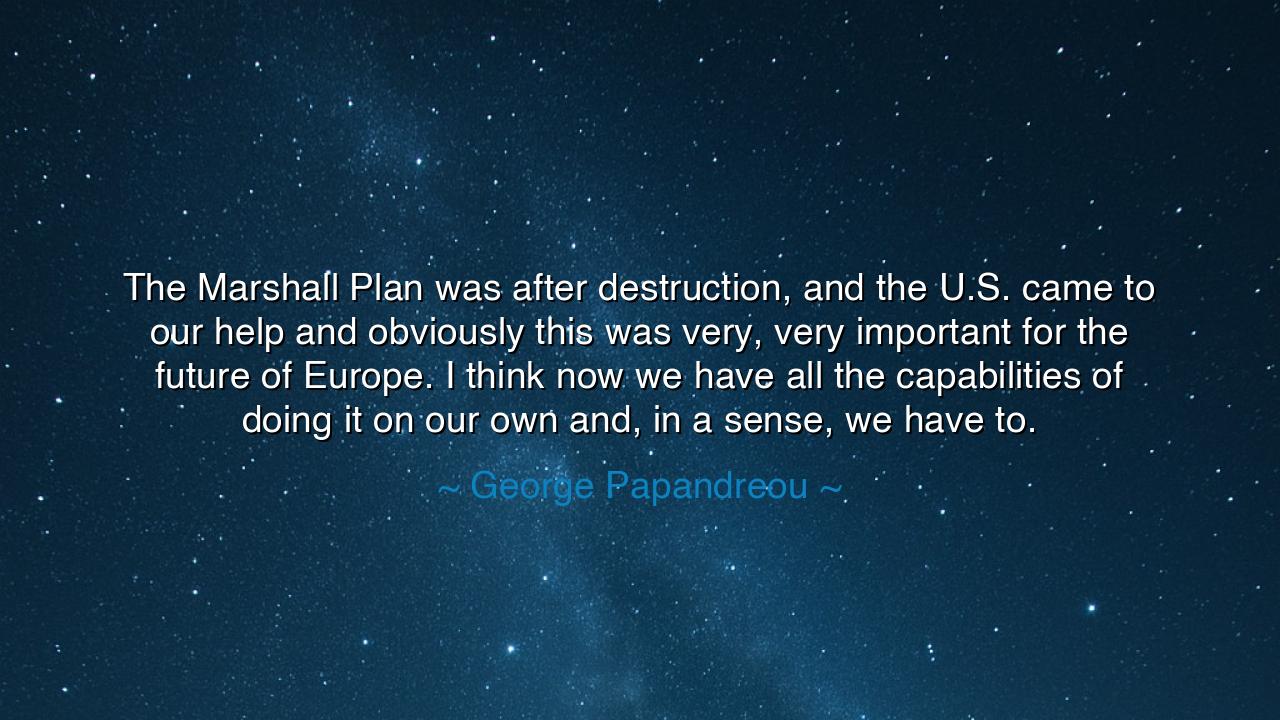
The Marshall Plan was after destruction, and the U.S. came to our
The Marshall Plan was after destruction, and the U.S. came to our help and obviously this was very, very important for the future of Europe. I think now we have all the capabilities of doing it on our own and, in a sense, we have to.






In the annals of history, there are moments when nations, devastated by the ravages of war, must rise from the ashes and rebuild themselves. George Papandreou’s words, "The Marshall Plan was after destruction, and the U.S. came to our help and obviously this was very, very important for the future of Europe. I think now we have all the capabilities of doing it on our own and, in a sense, we have to," reflect a pivotal moment in the struggle for recovery and independence. His reflection speaks not only to the history of Europe in the wake of World War II but also to the broader human experience of rising from destruction, learning from the past, and taking responsibility for one’s future.
The Marshall Plan, a grand act of generosity by the United States, was one of the most significant humanitarian efforts in modern history. After the devastation of World War II, much of Europe lay in ruins—economically shattered, politically fractured, and spiritually exhausted. In this moment of deep crisis, the U.S. extended its hand, offering aid, resources, and guidance to help Europe rebuild. This was not an act of mere charity, but a strategic investment in the future of a stable, prosperous Europe, one that could stand as a beacon of peace and prosperity in a divided world. But as Papandreou acknowledges, that support was a crucial turning point, one that laid the foundation for Europe's eventual independence and growth.
In the ancient world, the idea of rebuilding from destruction was a central theme. Consider the story of Cyrus the Great, the Persian king who, after the destruction of Babylon, sought to rebuild the city in a way that respected both its history and its people. He brought together the exiled peoples, restored their dignity, and rebuilt the infrastructure of the city, ensuring that its greatness would not be lost. Like Cyrus, the Marshall Plan aimed to restore Europe, not simply by providing resources, but by empowering the people to reclaim their own future. It was a moment of collective recovery, one that offered the possibility of renewal and hope for generations to come.
Papandreou’s words also speak to the self-sufficiency that Europe has achieved in the years since the Marshall Plan. Like the great civilizations of old, which, after periods of conquest and suffering, emerged stronger and more independent, Europe has risen from its post-war ashes. The capabilities that Papandreou refers to are the fruits of decades of effort, of hard work, of innovation, and of the shared commitment of European nations






AAdministratorAdministrator
Welcome, honored guests. Please leave a comment, we will respond soon